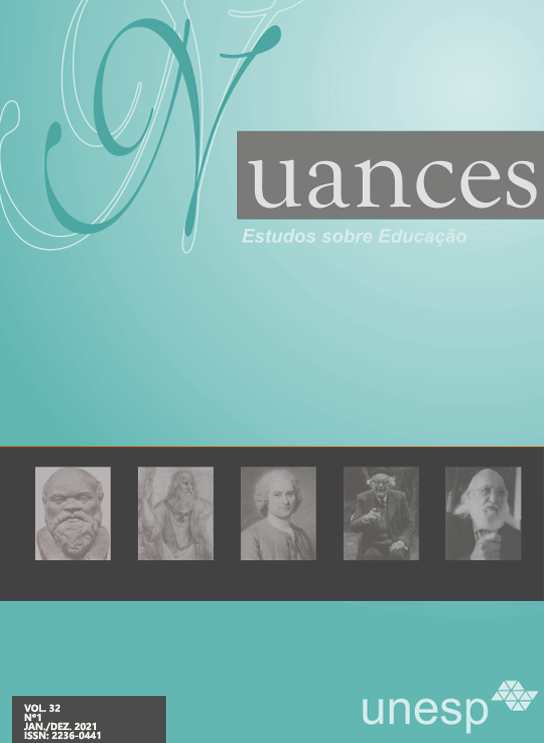Trajetória educacional individual do aluno: estágios e requisitos para a construção
DOI:
https://doi.org/10.32930/nuances.v32i00.9126Palavras-chave:
Estratégia educacional individual, Trajetória educacional individual, Percurso educacional individual, Educação centrada na pessoaResumo
O artigo discute a trajetória educacional individual, as etapas de construção da trajetória educacional individual, os requisitos para a construção da trajetória educacional individual e a individualização do processo educacional. Uma trajetória educacional individual pode ser definida como uma forma pessoal de perceber o potencial pessoal do aluno no processo educacional. A construção e implementação de trajetórias educacionais individuais são possíveis desde que os alunos implementem uma cadeia de escolhas logicamente justificada no curso de suas atividades educacionais que conduzam ao resultado necessário. Um papel especial na construção e implementação de trajetórias educacionais individuais (rotas) é desempenhado pela natureza da interação entre o professor e o aluno. O mais bem sucedido é considerado o apoio psicológico e pedagógico, ou seja, um sistema de apoio individual no desenvolvimento pessoal e profissional, bem como o aconselhamento na formação da experiência profissional individual e no domínio das competências profissionais.Downloads
Referências
ALEKSANDROVA, E. A. Pedagogičeskoe soprovoždenie staršeklassnikov v processe razrabotki i realizacii individualʹnyh obrazovatelʹnyh traektorij [Pedagogical Support of Senior Pupils During Development and Realizations of Individual Educational Trajectories]. 2006. Dissertation (Doctorate in Pedagogical Sciences) – University, Tyumen, 2006.
ALEKSEEV, N. A. Pedagogicheskie osnovy proektirovaniya lichnostno-orientirovannogo obucheniya [Pedagogical foundations of student-centered learning design]. 1997. Dissertation (Doctorate in Pedagogical Sciences) – University, Ekaterinburg, 1997.
ANIKEEV, V. A. Usloviya effektivnoi realizatsii individualnogo podkhoda v obuchenii [Conditions for the effective implementation of an individual approach to training]. 1997. Dissertation (Doctorate in Pedagogical Sciences) – University, Moscow, 1997.
BAIBORODOVA, L. V. Klyuchevye idei subektno-orientirovannoi tekhnologii individualizatsii obrazovatelnogo protsessa v pedagogicheskom vuze [Key ideas of subject-oriented technology of individualization of the educational process in a pedagogical university]. Vestnik Novosibirskogo gosudarstvennogo pedagogicheskogo universiteta, n. 5. p. 7-21, 2018. DOI: 10.15293/2226-3365.1805.01
KHUTORSKOI, A. V. Sovremennaja didaktika: Učebnik dlja vuzov [Modern Didactics: Textbook for Higher Education Institutions.]. Saint Petersburg: Piter, 2001.
LOMAKINA, T. Y. Kontseptualnye osnovy formirovaniya obrazovatelnoi traektorii v sisteme nepreryvnogo obrazovaniya [Conceptual foundations for the formation of an educational trajectory in the system of lifelong education]. In: SMIRNOV, I. P.; TKACHENKO, E. V.; CHISTYAKOVA, S. N. (eds.). Nauka I professionalnoe obrazovanie [Science and vocational education]. Moscow, 2013. p. 248-256.
OSMOLOVSKAYA, I. M. Innovatsionnye obrazovatelnye praktiki: didakticheskii aspekt [Innovative educational practices: the didactic aspect]. Novoe v psikhologo-pedagogicheskikh issledovaniyakh [New in Psychological and Pedagogical Research], v. 3, n. 47. p.37-46, 2017.
POPOVA, N. V. Ključevye temy aktualʹnoj obrazovatelʹnoj politiki i praktiki [Key Issues of Contemporary Educational Policy and Practice]. Vysshee obrazovanie v Rossii [Higher Education in Russia], Moscow, n. 10. p. 26-38, 2017.
POPOVA, O. S. Lichnostnoe razvitie uchashchikhsya kak osnovanie differentsialno-tipologicheskogo podkhoda k ikh psikhologicheskomu soprovozhdeniyu [Personal development of students as the basis of the differential-typological approach to their psychological support]. Mir Obrazovaniya – Obrazovanie v Mire, n. 2. p. 193-202, 2014.
SAZONOV, B. A. Organizacija obrazovatelʹnogo processa: vozmožnosti individualizacii obučenija [Organization of the Educational Process: Opportunities for Individualization of Training]. Vysshee Obrazovanie v Rossii [Higher Education in Russia], Moscow, v. 29, n. 6. p. 35-50, 2020. https://doi.org/10.31992/0869-3617-2019-29-6-35-50
VILANDEBERK, A. A.; SHUBINA, N. L. Novyi uchebnyi protsess: Korotko o glavnom: Metodicheskoe posobie dlya prepodavatelei [New Learning Process: Key Points: A Toolkit for Educators]. Saint Petersburg: Publishing house of the Russian State Pedagogical University named after A.I. Herzen, 2007.
ZEER, E. F.; SYMANYUK, E. E. Individualʹnye obrazovatelʹnye traektorii v sisteme nepreryvnogo obrazovanija1 [Individual educational trajectories in the system of continuous education]. Pedagogicheskoe obrazovanie v Rossii [Teacher Education in Russia], Moscow, n. 3. p. 74-82, 2014.
Downloads
Publicado
Como Citar
Edição
Seção
Licença
Atribuição-NãoComercial
CC BY-NC
Esta licença permite que outros remixem, adaptem e criem a partir do seu trabalho para fins não comerciais, e embora os novos trabalhos tenham de lhe atribuir o devido crédito e não possam ser usados para fins comerciais, os usuários não têm de licenciar esses trabalhos derivados sob os mesmos termos.





